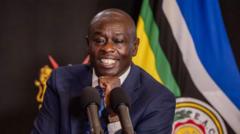Kenyan Deputy President Rigathi Gachagua's political fate hangs in the balance as the Senate trial commences. Last week, the National Assembly overwhelmingly voted to impeach him, setting the stage for this crucial Senate trial. Gachagua is facing 11 charges, including corruption, inciting ethnic divisions, and undermining government functions, all of which he denies.
The backdrop to this political drama is his fallout with President William Ruto, who has remained reticent on the issue. Initially, a smaller committee was to conduct the investigation, but now it unfolds in the full Senate. The evidence presentation against Gachagua coincides with a tumultuous period in Kenyan politics, exacerbated by economic strains and public dissatisfaction, as evident in recent protests.
The trial's schedule is tight. On Wednesday, the National Assembly's evidence is to be showcased, followed closely by cross-examinations. Thursday promises intense sessions as Gachagua's defense presents its case. Senate members will then engage in a debate, followed by a vote, which could extend into Friday. A two-thirds majority is required to confirm his removal.
A successful impeachment would bar Gachagua from holding public office in the future, a decision he is expected to contest legally. His attempts to thwart the process through the courts have so far been rebuffed, with judicial rulings favoring the trial's progression.
One particular charge involves amassing assets worth billions, allegedly post-taking office, which Gachagua attributes to his late brother's estate. The deputy president's journey from first-time MP to deputy leader was marked by surviving previous corruption allegations, adding layers to his current predicament.
This unfolding story has become a prominent discussion point as it highlights internal rifts within Kenya's leadership and shifts attention from pressing economic issues faced by citizens. The ongoing political upheaval and its parallels to past protests illuminate the fragile socio-political fabric of the nation.
The backdrop to this political drama is his fallout with President William Ruto, who has remained reticent on the issue. Initially, a smaller committee was to conduct the investigation, but now it unfolds in the full Senate. The evidence presentation against Gachagua coincides with a tumultuous period in Kenyan politics, exacerbated by economic strains and public dissatisfaction, as evident in recent protests.
The trial's schedule is tight. On Wednesday, the National Assembly's evidence is to be showcased, followed closely by cross-examinations. Thursday promises intense sessions as Gachagua's defense presents its case. Senate members will then engage in a debate, followed by a vote, which could extend into Friday. A two-thirds majority is required to confirm his removal.
A successful impeachment would bar Gachagua from holding public office in the future, a decision he is expected to contest legally. His attempts to thwart the process through the courts have so far been rebuffed, with judicial rulings favoring the trial's progression.
One particular charge involves amassing assets worth billions, allegedly post-taking office, which Gachagua attributes to his late brother's estate. The deputy president's journey from first-time MP to deputy leader was marked by surviving previous corruption allegations, adding layers to his current predicament.
This unfolding story has become a prominent discussion point as it highlights internal rifts within Kenya's leadership and shifts attention from pressing economic issues faced by citizens. The ongoing political upheaval and its parallels to past protests illuminate the fragile socio-political fabric of the nation.

















